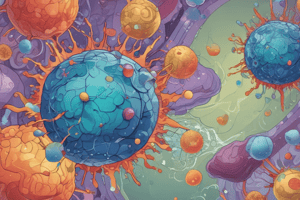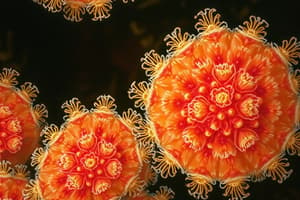Podcast
Questions and Answers
Antibodies are produced by ________. (Select one)
Antibodies are produced by ________. (Select one)
- T cells
- B cells
- bone marrow
- plasma cells (correct)
Cellular adaptive immunity is carried out by ________. (Select one)
Cellular adaptive immunity is carried out by ________. (Select one)
- T cells (correct)
- neutrophils
- bone marrow
- B cells
A single antigen molecule may be composed of many individual ________. (Select one)
A single antigen molecule may be composed of many individual ________. (Select one)
- epitopes (correct)
- MHC II
- B-cell receptors
- T-cell receptors
Which class of molecules is the most antigenic? (Select one)
Which class of molecules is the most antigenic? (Select one)
Match the following antibody classes with their descriptions:
Match the following antibody classes with their descriptions:
The second critically important aspect of adaptive immunity is ________.
The second critically important aspect of adaptive immunity is ________.
________ immunity involves the production of antibody molecules that bind to specific antigens.
________ immunity involves the production of antibody molecules that bind to specific antigens.
The heavy chains of an antibody molecule contain ________ region segments.
The heavy chains of an antibody molecule contain ________ region segments.
The variable regions of the heavy and light chains form the ________ sites of an antibody.
The variable regions of the heavy and light chains form the ________ sites of an antibody.
MHC I molecules present ________. (Select one)
MHC I molecules present ________. (Select one)
MHC II molecules present ________. (Select one)
MHC II molecules present ________. (Select one)
Which type of antigen-presenting molecule is found on all nucleated cells? (Select one)
Which type of antigen-presenting molecule is found on all nucleated cells? (Select one)
Which type of antigen-presenting molecule is found only on macrophages, dendritic cells, and B cells? (Select one)
Which type of antigen-presenting molecule is found only on macrophages, dendritic cells, and B cells? (Select one)
MHC molecules are used for antigen ________ to T cells.
MHC molecules are used for antigen ________ to T cells.
MHC II molecules consist of a larger α subunit and a smaller subunit called ________.
MHC II molecules consist of a larger α subunit and a smaller subunit called ________.
Which of the following would be a T-dependent antigen? (Select one)
Which of the following would be a T-dependent antigen? (Select one)
Which of the following would be a BCR? (Select one)
Which of the following would be a BCR? (Select one)
Which of the following does not occur during the lag period of the primary antibody response? (Select one)
Which of the following does not occur during the lag period of the primary antibody response? (Select one)
________ antigens can stimulate B cells to become activated but require cytokine assistance delivered by helper T cells.
________ antigens can stimulate B cells to become activated but require cytokine assistance delivered by helper T cells.
T-independent antigens can stimulate B cells to become activated and secrete antibodies without assistance from helper T cells. These antigens possess ________ antigenic epitopes that cross-link BCRs.
T-independent antigens can stimulate B cells to become activated and secrete antibodies without assistance from helper T cells. These antigens possess ________ antigenic epitopes that cross-link BCRs.
What is a superantigen?
What is a superantigen?
Flashcards are hidden until you start studying
Study Notes
Antibodies and Immune Cells
- Antibodies are produced by plasma cells.
- Cellular adaptive immunity is primarily executed by T cells.
- Epitopes are individual components of a single antigen molecule.
Antigen Characteristics
- Proteins are the most antigenic class of molecules, followed by polysaccharides, lipids, and carbohydrates.
- Humoral immunity involves the production of antibodies for specific antigens.
Types of Immunoglobulins
- IgA: Found in large amounts in mucus secretions.
- IgD: Expressed on the surface of naïve B cells, not secreted by them.
- IgE: Associated with defense against parasitic infections and allergic responses.
- IgG: The only antibody class that can cross the placenta.
- IgM: The first antibody to respond after B cell activation.
Adaptive Immunity Concepts
- Key aspects of adaptive immunity are specificity and memory.
- Antibodies have constant regions in their heavy chains that define their class or isotype, and variable regions that create antigen-binding sites.
MHC Molecules and Antigen Presentation
- MHC I molecules present processed foreign antigens from proteasomes.
- MHC II molecules present processed foreign antigens from phagolysosomes.
- MHC I is found on all nucleated cells, whereas MHC II is exclusive to macrophages, dendritic cells, and B cells.
- MHC molecules function in the presentation of antigens to T cells.
T-dependent and T-independent Antigens
- T-dependent antigens, typically proteins, require cytokine support from helper T cells to activate B cells.
- T-independent antigens have repetitive epitopes allowing direct activation of B cells.
- Class switching to IgG does not take place during the lag period of the primary antibody response.
Superantigens
- Superantigens are potent proteins that stimulate a specific type of T cell response effectively, enhancing immune system activation.
Studying That Suits You
Use AI to generate personalized quizzes and flashcards to suit your learning preferences.





